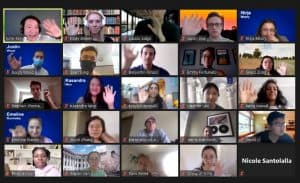Building a business analytics toolkit
As MS in Business Analytics students and business data scientists, we are expected to be well-rounded individuals who can both develop data science models and communicate insights to stakeholders. While the Master of Science in Business Analytics (MSBA) 2021 cohort consists of some of the best and brightest analytics talent, we come from diverse educational and professional backgrounds and each have our own strengths and areas for improvement. Coming from an engineering background, I wanted to learn not only the technical data science skills but also the business savvy to be able to make an immediate impact as a data scientist after graduation. One of the tools the MSBA degree uses to get everyone up to speed is the boot camps. After completing three weeks of rigorous boot camp courses, I feel well prepared to tackle the coming semester’s analytics challenges from all angles.
We kicked off the boot camps by studying the mathematical foundations that set us up for success in the remaining bootcamps and laid the groundwork for our fall courses. Professor Miller reviewed matrix operations and calculus, which are fundamental concepts in many machine learning techniques. We also discussed random variables, sampling, and distributions, which we were able to utilize soon after in Professor Stuk’s business statistics course. I really appreciated that Professor Miller spoke with each of our MSBA professors about which concepts were fundamental in their disciplines and designed the bootcamp around their feedback. Professor Miller will be teaching Decision Analytics in the spring semester, so we will get to learn more from him soon.
Next, we covered the basics of computing fundamentals, Linux, shell scripting, SQL, Python, and R in the technology bootcamp with Ettienne Montagner. I particularly enjoyed the computing fundamentals overview because having a thorough understanding of computer architecture and the mechanics of memory storage will give me significant advantages when developing data science models and debugging. Additionally, Lin Zhang walked us through a series of labs to help us develop hands-on experience with AWS, which is a highly demanded skill in the analytics job market. We were able to put together all our new technical knowledge in a final project in which we ran four Python and R scripts for data cleaning and exploration using a shell script on an AWS EC2 instance.
While taking the boot camps, we also took a full course on business statistics with Professor Stuk. In this class, we were able to immediately utilize the R skills that we developed the week prior in the tech bootcamp. We also quickly built on the knowledge from Professor Miller’s class pertaining to distributions and probability. The majority of the course was spent learning the ins and outs of regression analysis, and by the end of the course, each team built a comprehensive multiple regression model based on a nonprofit canvass and used it to predict revenue potential in new areas.
Throughout the three weeks of the bootcamp, we took crash courses in business principles that would be key to our applications of data science techniques. Dr. Chellappa, the MS in business Analytics dean, referred to the business boot camp as “an MBA in a week.” We started off learning economics and finance with Professor Smith, who left a lasting impact on me with his advice to spend time every day studying the market. In marketing class with Professor Hamilton, we discussed segmentation, which is a major application area of analytics. Professor Kim, a former consultant, taught us about not only the fundamentals of strategy and competitive advantage, but also how to be successful in the workforce. Finally, Dr. Chellappa demonstrated the concepts of operations by digging into a case study, which allowed us to get hands-on experience.
Although my background is in engineering, being part of the Goizueta Business School means that I am expected to not only have strong technical skills but also a solid business acumen. Thankfully, the MSBA boot camps expanded my business skills and solidified my technical skills. Looking forward, I feel equipped with the tools and mindset to become an effective business data scientist.

